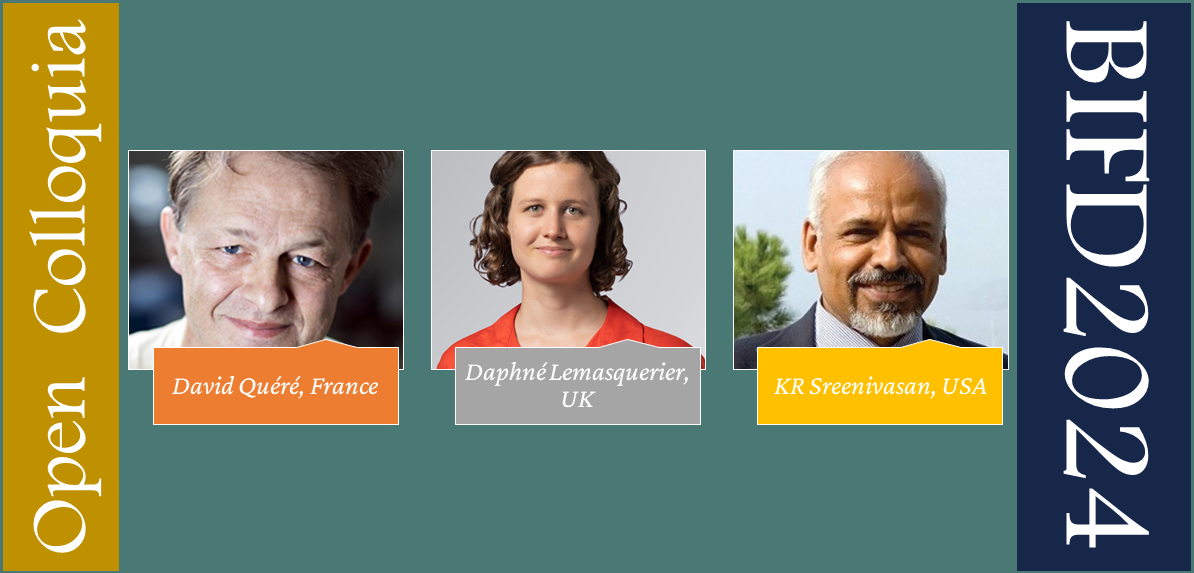Daphné Lemasquerier
Mathematics & Statistics, University of St. Andrews, UK
Daphné Lemasquerier first studied Physics and Chemistry of the Earth and other planets at ENS Lyon, France. She took an interest in geophysical fluid dynamics during an internship at Spinlab (UCLA, Los Angeles), where she studied experimentally libration-driven flows in planetary cores and subsurface oceans. She complemented her formation in Planetary sciences by a master in Fluid Mechanics and Nonlinear Physics at Aix-Marseille Université (France), before receiving a fellowship from ENS Lyon for a PhD at IRPHE laboratory (Marseille, France). She modelled experimentally, numerically and theoretically Jupiter's dynamics, including zonal jets, vortices and zonostrophic turbulence. She received her PhD in Engineering, Mechanics and Physics of Fluids in October 2021. For this work, she received the Andreas Acrivos Dissertation Award of the American Physical Society, the Turcotte Award of the American Geophysical Union and the L'Oréal-UNESCO "For Women In Science" award. From January to August 2022, she held a post-doctoral position at the University of Texas at Austin and worked on modelling the circulation in subsurface oceans of icy satellites of Jupiter and Saturn. Since September 2022, she is a Lecturer in Fluid Dynamics in the School of Mathematics and Statistics at the University of St Andrews (United Kingdom).
Topic: Fluid Dynamics of the Outer Solar System: from Gas Giants to Icy Satellites
The Jovian system is witnessing a major interdisciplinary scientific interest due to new observations from NASA's Juno mission, and upcoming observations by NASA's Europa Clipper and ESA's JUICE missions. In this talk, I propose to review some aspects and challenges of the fluid dynamics involved in the interiors of Jupiter and its icy satellites. In the first part of the talk, I will focus on subsurface oceans of icy moons which are responsible for coupling the deep mantle to the observed ice crust via material and heat exchanges. I will discuss how direct numerical simulations of turbulent rotating convection in spherical shells can help us to better constrain the mean circulation taking place in subsurface oceans. I will discuss in particular the effect of tidal heating within the silicate mantle, which is laterally heterogeneous. In the second part of the talk, I will focus on the complex, multiscale dynamics that takes place in the atmosphere and liquid hydrogen of Jupiter. Jupiter’s atmosphere exhibits strong large-scale east-west winds called zonal jets, which self-organize from the underlying turbulent flow. Based on experimental observations and analytical modelling, I will discuss the emergence and nonlinear equilibration of zonal jets and emphasize the role of Rossby waves in exchanging momentum with the zonal flow, as well as the feedback of the zonal flow on the waves.
Katepalli R Sreenivasan
Tandon School of Engineering, Department of Physics & Courant Institute of Mathematics, NYU, USA
KR Sreenivasan (Sreeni) is a professor at New York University, where he is the University Professor and Eugene Kleiner Chair for Innovation, Professor in the Physics Department, Courant Institute of Mathematical Sciences, and Tandon School of Engineering, and directs the Center for Space Science at the NYU Abu Dhabi campus. He is a fluid dynamicist with a broad range of interests, and expertise spanning experiment, theory and simulations. He has an enormous range of experience in scientific leadership and has served the scientific community, especially the APS, in various capacities. Sreeni obtained his Ph.D. from the Indian Institute of Science (IISc) and did post doctoral work in Australia and the USA. He was Horald W. Cheel professor at Yale where he worked for 22 years. He then took up the position of director, Institute of Physical Sciences and Technology at the University of Maryland. He was the director of Abdus Salam ICTP during 2003-09. His memberships include: US National Academy of Sciences; US National Academy of Engineering; American Academy of Arts and Sciences; Indian Academy of Sciences; Indian National Science Academy; and African Academy of Sciences. His honours include the Guggenheim Fellowship; Otto Laporte Award, American Physical Society; Distinguished Alumnus Award, IISc; International Panetti-Ferrari Prize and Gold Medal, Torino Academy of Sciences; and National Order of Scienctific Merit, Brazil.
Topic: Changes in outlook on turbulent wall flows over the past forty years
Recent research on turbulent pipe and channel flows, as well as boundary layers, has called into question a number of ideas that had been taken as central and final some forty years ago. We summarize these ideas and discuss their applicability; we will ask and answer the question of whether we have advanced our understanding.
David Quéré
ESPCI-Paris and École polytechnique, France
After one year in the French Navy (where he scrutinized the radioactive cloud of Chernobyl), David Quéré obtained a Ph.D. from Université Pierre et Marie Curie, Paris. He became since a research director at CNRS and a Professor at École Polytechnique (Departments of Physics and Mechanics). He is engaged in experimental research in Soft Matter Physics and Fluid Mechanics, with a strong interest in interfacial hydrodynamics (drops, films, bubbles, coating, wicking) as well as in aerodynamics, morphogenesis and biomimetics, all topics on which he coworked with about 35 PhD students. He received the 2014 Silver Medal of CNRS and the 2021 APS Prize in Fluid Dynamics, and he became a Distinguished Professor at ESPCI in 2016.
Topic: Bouncing Drops
We discuss a few situations where drops impacting a solid bounce on it, which defines what we can call 'repellency'. The discussion includes the role of the solid, the nature of the liquid and the parameters that characterize the rebounds.



